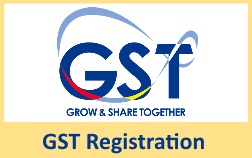Inexpensive Alternatives for the very best GST Registration Services in Singapore
Inexpensive Alternatives for the very best GST Registration Services in Singapore
Blog Article
From Beginning To End: The Ultimate Roadmap to GST Registration for Services Looking For Financial Stability
Navigating the complexities of Item and Provider Tax (GST) enrollment is an essential action for companies striving for financial stability. From comprehending the basic concepts of GST to following post-registration guidelines, the procedure can appear daunting in the beginning look. Breaking down the roadmap into workable steps can enhance the enrollment trip for organizations looking to enhance their economic standing. Let's check out the essential elements that comprise this utmost roadmap and uncover just how each phase adds to laying a strong structure for economic success.
Comprehending GST Fundamentals
Looking into the fundamental concepts of Item and Solutions Tax (GST) is vital for acquiring an extensive understanding of its implications on businesses and the economic situation. GST is a value-added tax obligation levied on the majority of items and solutions for domestic intake. It has actually replaced multiple indirect tax obligations that existed in the pre-GST age, streamlining the tax obligation framework and enhancing ease of doing organization in India. Under the GST system, both services and products are exhausted at a specific price, which is established based upon their classification. If their annual turn over exceeds the threshold restriction set by the federal government, companies are called for to register for GST. Input Tax Obligation Credit History (ITC) is a significant attribute of GST, allowing services to claim debt for taxes paid on inputs, reducing the total tax obligation burden. Recognizing the fundamentals of GST is essential for companies to comply with tax policies, manage their finances successfully, and add to the country's financial growth by joining a transparent tax system.
Eligibility Requirements for Registration
As of the existing laws, the threshold limitation for GST enrollment is an annual accumulation turn over of 40 lakhs for services running within a state, except for unique category states where the restriction is 20 lakhs. In addition, specific organizations are needed to sign up for GST regardless of their turnover, such as interstate vendors, informal taxed persons, and services liable to pay tax obligation under the reverse cost mechanism. It is vital for companies to completely analyze their turnover and deal types to establish their GST registration responsibilities properly.
Records Required for Registration
Having satisfied the qualification standards for GST registration, companies need to currently guarantee they have the requisite documents in location to wage the enrollment procedure successfully. The documents required for GST registration usually consist of evidence of business constitution, such as partnership deed, registration certification, or consolidation certification for various sorts of businesses. In addition, organizations need to provide documents establishing the principal business, such as a rental contract or electrical energy costs. PAN card of business, in addition to the identity and address proof of promoters/partners/directors, are vital for verification objectives. Checking account declarations, in addition to terminated cheques or he has a good point a duplicate of the bank passbook, are required to validate the economic information supplied during registration. Furthermore, organizations have to have electronic signatures ready for the authorized signature. Making sure all these files are organized and conveniently available will expedite the GST enrollment process, enabling organizations to abide by tax regulations flawlessly.
Step-by-Step Registration Process
Beginning the GST registration process involves a series of structured actions to make certain a seamless and certified enrollment for companies. The initial step is to visit the GST site and fill out the enrollment kind with precise information of business entity. Following this, the candidate obtains a Short-term Recommendation Number (TRN) which is utilized to resume the application process if it's not finished in one go.
Following, all needed documents according to the checklist offered by the GST portal demand to be uploaded. These documents commonly include evidence of organization address, registration and identity evidence of marketers, financial statements, and business entity's frying pan card.

Post-Registration Conformity Guidelines

Final Thought
In verdict, services looking for financial stability should understand the essentials of GST, meet eligibility standards, gather needed records, adhere to the step-by-step registration procedure, and abide by post-registration standards - Best GST registration services in Singapore. By sticking to these steps, services can ensure compliance with tax laws and maintain monetary stability over time
Furthermore, particular companies are needed to sign up for GST irrespective of their turn over, such as interstate vendors, laid-back taxable persons, and companies responsible to pay tax obligation under the reverse internet charge device.Having satisfied the qualification criteria for GST registration, services have to currently ensure they have the requisite records in place to proceed with the enrollment procedure effectively. The records required for GST registration usually consist of evidence of organization constitution, such as collaboration act, enrollment certificate, or incorporation certification for various kinds of companies. Furthermore, services need to supply files establishing the major location of service, such as a rental contract or power bill.Starting the GST registration procedure includes a series of organized steps to make certain a smooth and compliant enrollment for businesses.
Report this page